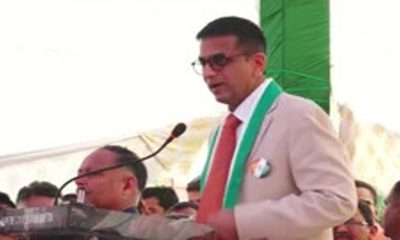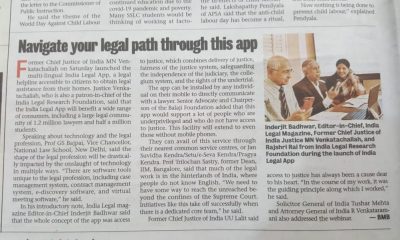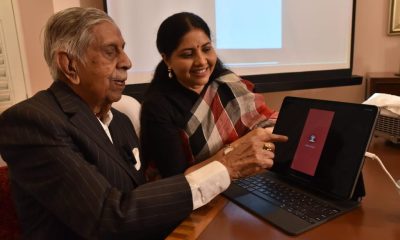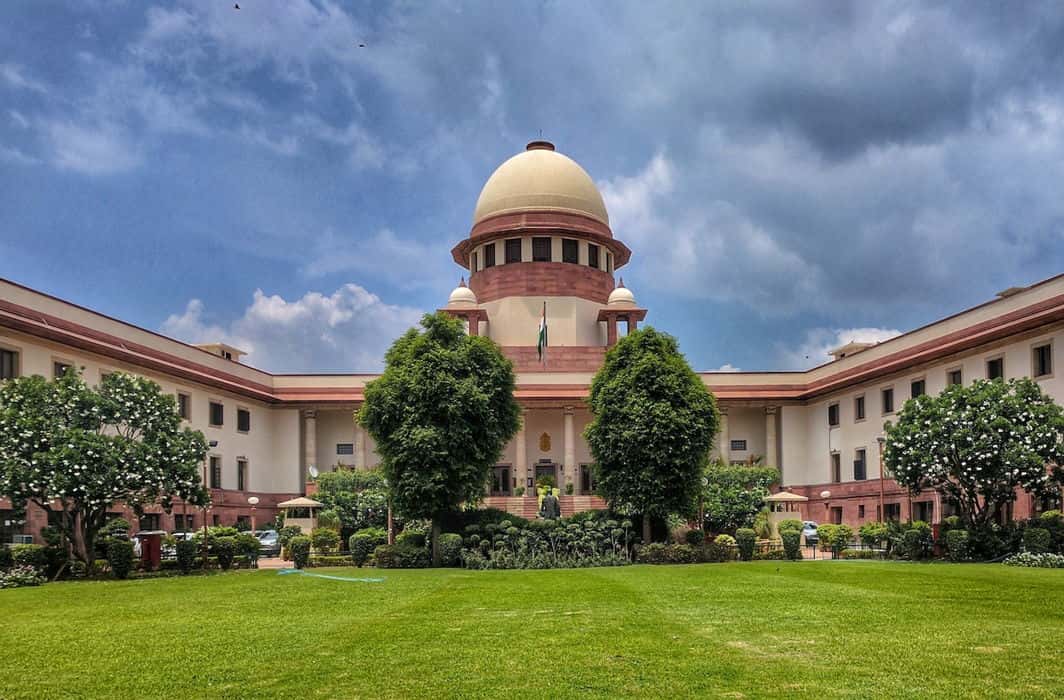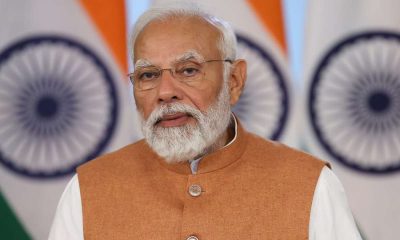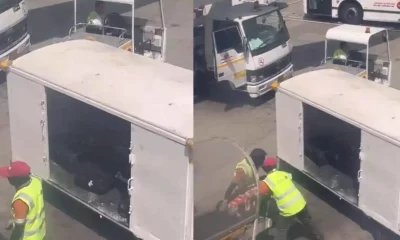India News
A Dramatic, Powerful Initiative
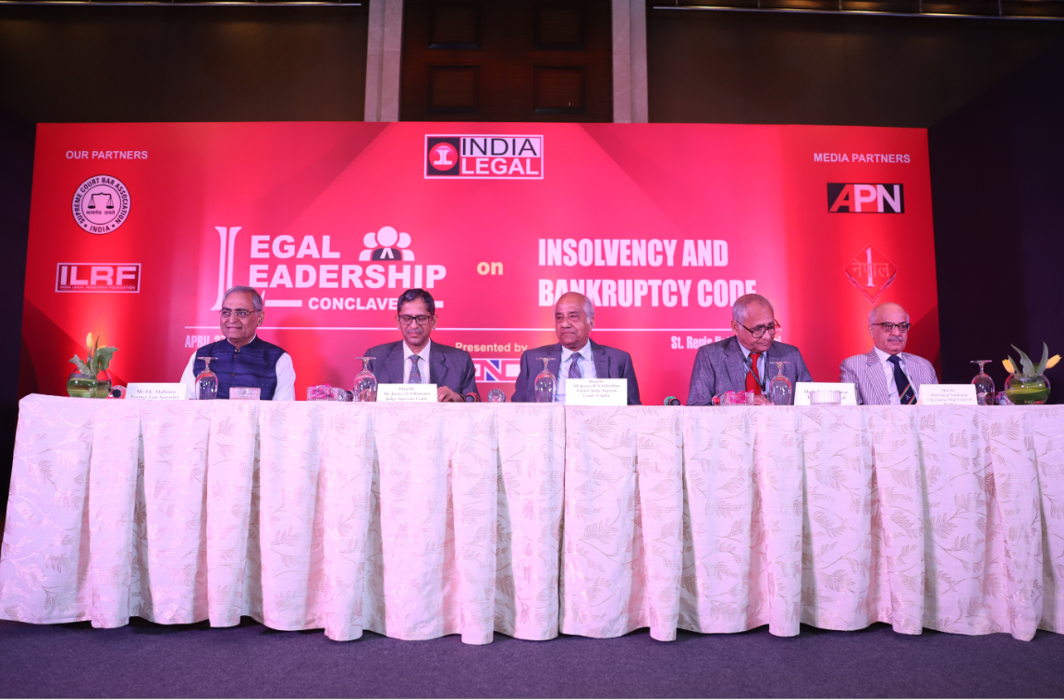
Above: (L to R) Former law secretary P K Malhotra, Supreme Court judge Justice N V Ramana, Former Supreme Court judge Justice B N Srikrishna, Editor-in- Chief of India Legal, Inderjit Badhwar and Chief Justice of Bombay High Court Justice Pradeep Nandrajog in the Legal Leadership Conclave /Photo: Anil Shakya
By Inderjit Badhwar
As the first and only weekly, independent politico-legal journal that covers an entire gamut of legal news and developments in the country, India Legal magazine has constantly endeavoured to promote the spread of legal education. This approach forms the bedrock of all our media initiatives, including the widely acclaimed news channels APN TV and N1 News. Both carry national news as well as in-depth, interactive legal programmes, including a live, daily legal helpline.
India Legal weekly, APN TV and N1 News channels are a part of the ENC Group which takes great pride and responsibility in promoting new ideas, initiatives, and recommendations for the benefit of not only the legal fraternity but also society at large. In continuing with this tradition, we are pleased to inform our readers about the launch of a series of Legal Leadership Conclaves in partnership with the Supreme Court Bar Association and various national law universities and state legal authorities.
While it is common to hear of leadership summits and conclaves which focus on themes like politics, business, technology, arts and culture, it’s rather rare to have a forum exclusively dedicated to the exchange of ideas on law.
The Legal Leadership Conclave is a significant attempt by the ENC Group to fill that void. These conclaves are being held nationwide on a wide range of contemporary legal issues with the participation of sitting judges of the Supreme Court and high courts and several other legal luminaries and thought leaders.
By the time this issue hits the stands, we would have hosted the first of these events on April 27, 2019, at the St Regis Hotel, Mumbai, with the Insolvency and Bankruptcy Code (IBC) as the topic for discussion.
Joining hands with India Legal for this Conclave are the Supreme Court Bar Association (SCBA), the Maharashtra National Law University, Mumbai (MNLU) and the India Legal Research Foundation (ILRF), all leading institutions in their own right. The SCBA, which works tirelessly in upholding the professionalism and integrity of Supreme Court lawyers, is an important pillar of our legal system.
Our second partner, MNLU, is one of the youngest national law universities and is already taking great strides by attracting some of the brightest minds in the country. Our third partner, the ENC Group-promoted ILRF, is a non-profit organisation which is committed to bringing justice to those who deserve it but cannot afford it.
At the time we were planning the Mumbai conclave a few weeks back, the IBC emerged as the topic for discussion almost unanimously, the reasons for which are not hard to fathom. The IBC is a major economic reform initiated in the country in recent times to provide for a time-bound insolvency resolution process. Since it was enacted in 2016, as many as 12,000 insolvency cases have been filed under it and around Rs 1 lakh crore has been recovered through insolvency proceedings. Before the introduction of the IBC, it took companies about four to five years to dissolve their operations; now the time has dropped drastically to a year.
As with any new legislation, however, the IBC’s smooth implementation has been riddled with many issues that had not been thought of at the time of drafting the legislation. Some of these issues have been addressed by way of legislative amendments and court orders. This conclave proffered another opportunity for various stakeholders to deliberate on several aspects such as practical issues in the insolvency resolution process and recent developments in the IBC as well as a prognosis of what is to come.
—India Legal
2024 Lok Sabha Elections
PM Modi calls for high voter turnout in second phase of Lok Sabha elections 2024, says your vote is your voice
Prime Minister Narendra Modi urges citizens to participate in record numbers during the second phase of polling for the Lok Sabha Elections 2024.
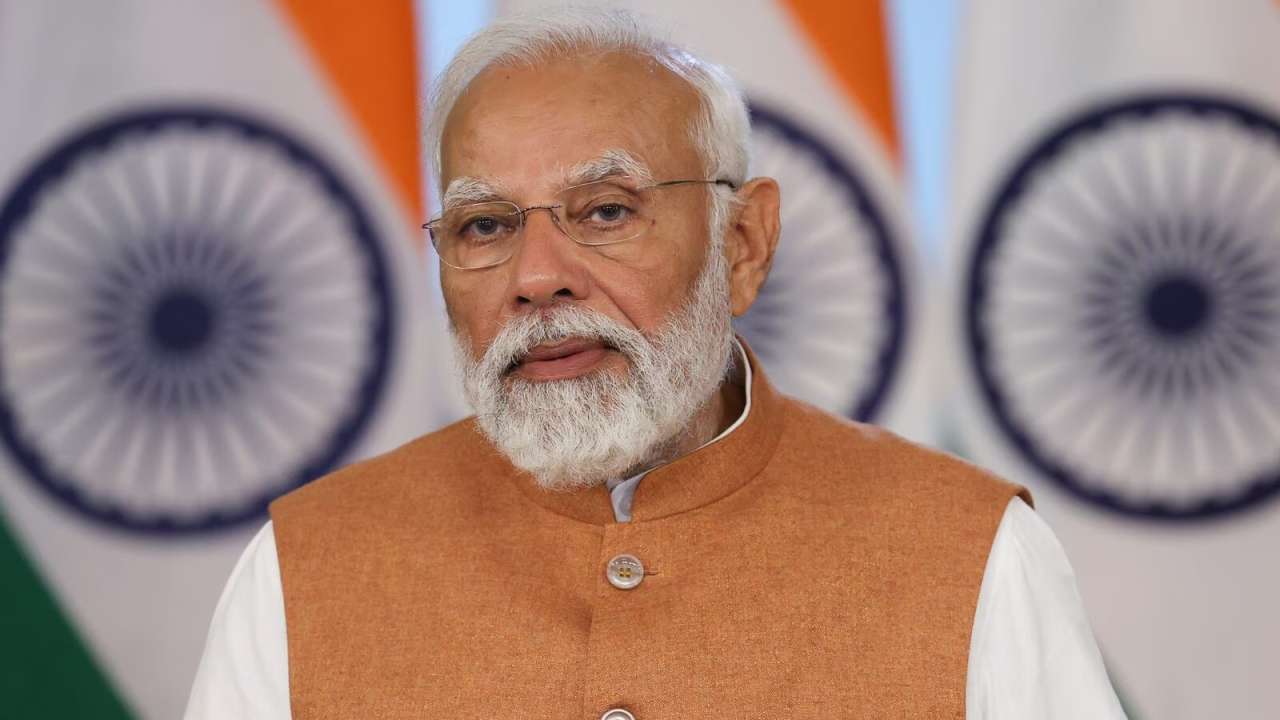
Prime Minister Narendra Modi took to social media as the second phase of voting for the Lok Sabha Elections of 2024 got underway across the country to encourage voters to cast votes in huge numbers. PM Modi emphasized in his speech the value of voting in preserving democracy and notably urged women and young people to cast votes.
Taking to social media X, formerly Twitter, PM Modi wrote, urging everyone in constituencies to participate in record numbers in today’s second phase of the Lok Sabha elections. He said our democracy is strengthened by high voter turnout. He especially urged female and youth voters to cast votes in large numbers. Your vote is your voice, he added.
It is important to remember that 88 Lok Sabha constituencies—spread among 13 states and Union Territories—are presently holding polls. Twenty seats in Kerala, fourteen in Karnataka, thirteen in Rajasthan, eight in Uttar Pradesh and Maharashtra, six in Madhya Pradesh, five in Assam and Bihar, three in Chhattisgarh and West Bengal, and one in each of Tripura, Jammu & Kashmir, and Manipur are currently up for election. Notably, the untimely death of a Bahujan Samaj Party (BSP) candidate has resulted in the Madhya Pradesh constituency of Betul being spared from voting on April 26.
Meanwhile, Chief Election Commissioner Rajiv Kumar emphasized the thorough planning that has taken place over the previous two years and reassured the public of careful security measures at every voting place. They have been preparing for the last two years, he said. At each booth, the arrangements are ready. Everything has been prepared for the voters, including fans and drinking water. Voters must turn out to cast their votes. Safety has been considered. There is zero information available anywhere regarding violence. However, there will be forces at every booth.
2024 Lok Sabha Elections
Bollywood actor Neha Sharma campaigns for her father Ajit Sharma in Bhagalpur, Bihar
The Bollywood actor posted a video on her Instagram handle which showed her journey through various districts of Bihar, including Kishanganj, Banka, Purnea and Katihar. She was dressed in a traditional salwar kameez and was seen greeting and encouraging the public to cast their votes.
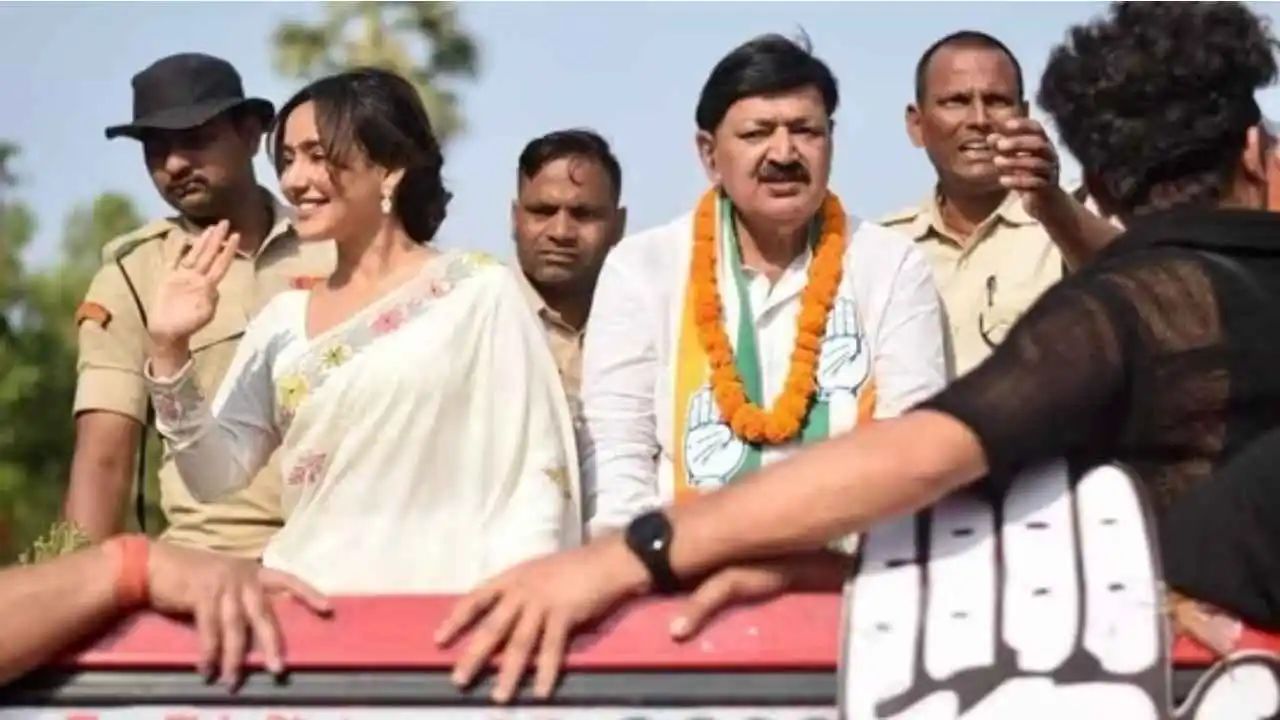
Bollywood actor Neha Sharma’s recent participation in a roadshow in Bihar has taken the internet by storm. Sharma, known for her roles in films like Tum Bin 2 and Crook, was seen supporting her father, Ajit Sharma, who is contesting from Bhagalpur Lok Sabha seat on a Congress ticket. The roadshow came amid speculations that the actor might enter politics. But, it is now clear that she was just campaigning for her father.
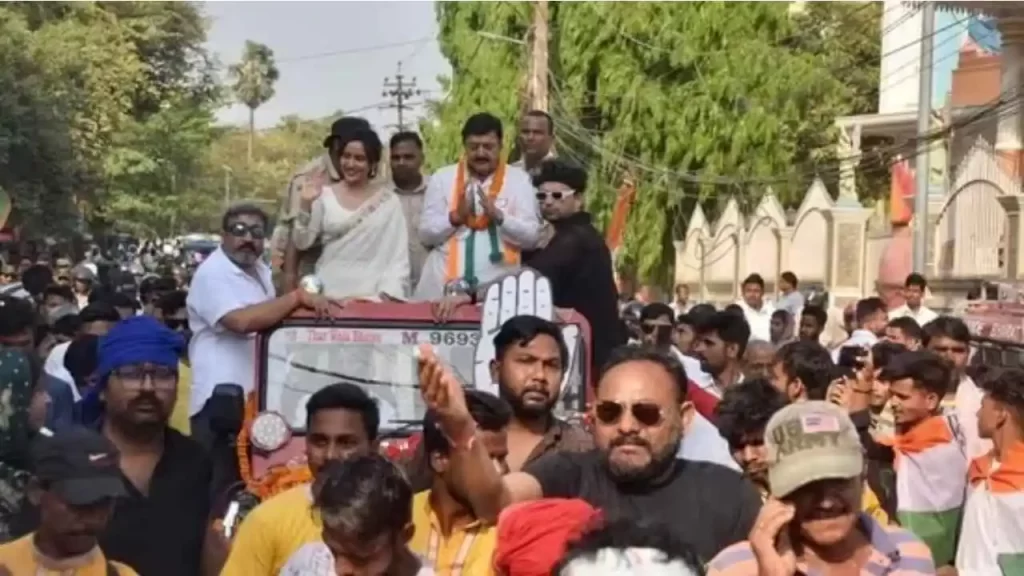
The Bollywood actor posted a video on her Instagram handle which showed her journey through various districts of Bihar, including Kishanganj, Banka, Purnea and Katihar. She was dressed in a traditional salwar kameez and was seen greeting and encouraging the public to cast their votes.
The actor received a warm reception and love from a large crowd in Pirpainti and Kahalgaon during her roadshow. She wrote on Instagram that it is said when someone gives one a place in their heart, then they live there forever. She said her heart is full of all the love and support she was receiving from the people. She thanked the people for the warm welcome she got in Pirpainti and Kahalgaon. Aapka pyar sar ankhon par.
Another video, circulating on social media showed the actor actively participating in her father’s election campaign in Bhagalpur. The election to the Bhagalpur Lok Sabha seat is set to take place in the 2nd phase on April 26. Ajit Sharma is representing the Congress and is up against JDU’s Ajay Kumar Mandal in this seat.
Earlier, there had been rumours and speculations that Neha Sharma might join politics. But many reports have clarified that she is not making her political debut yet. The Bollywood actor had been offered the opportunity to join politics by her father Ajjit Sharma but she is currently focusing on her acting career.
Education
Farmer’s son Nilkrishna Gajare Nirmalkumar from Maharashtra scores 100 NTA score in IIT-JEE Mains 2024
Nilkrishna Gajare’s father is a farmer and had to discontinue his own education after Class 12 as he faced financial difficulties. Gajare faced financial challenges growing up. However, his unwavering dedication and strategic approach to preparation set him apart from the crowd.
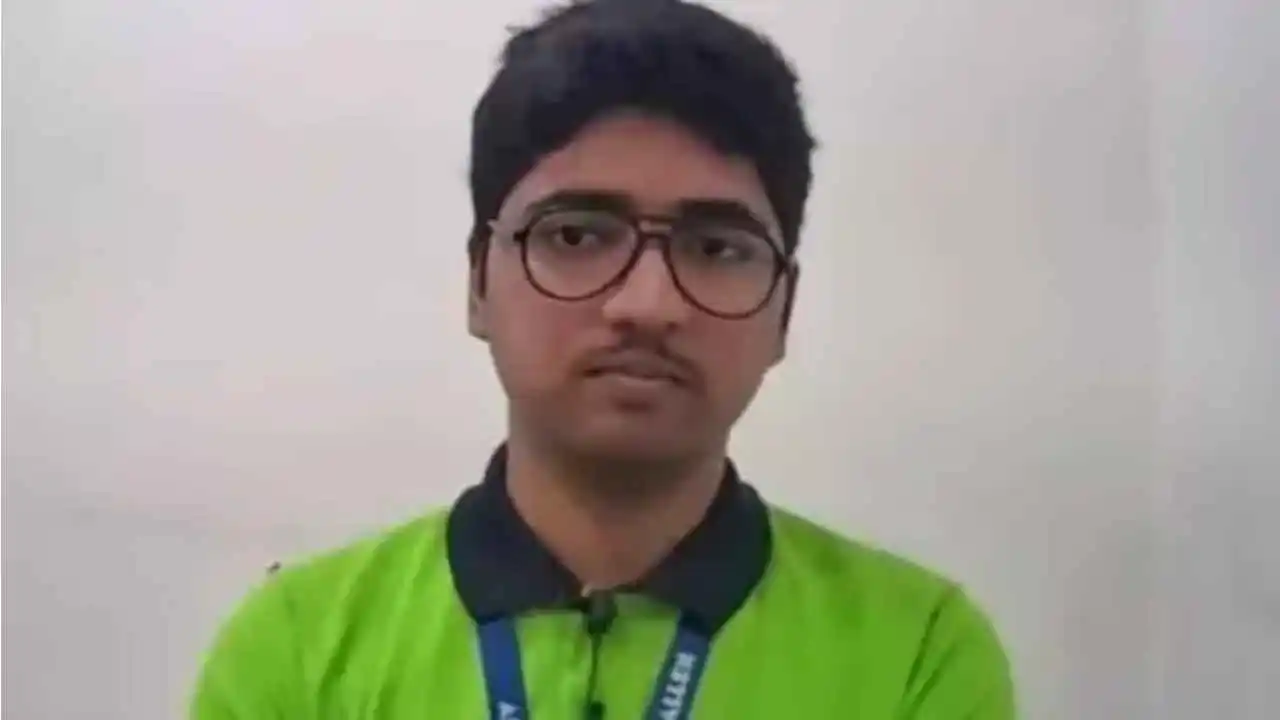
Nilkrishna Gajare, who hails from Maharashtra’s Washim, achieved an extraordinary feat by securing a perfect score of 100 in the JEE Main 2024 examination. His journey from humble beginnings to the pinnacle of success is a source of inspiration for many people.
Nilkrishna Gajare’s father is a farmer and had to discontinue his own education after Class 12 as he faced financial difficulties. Gajare faced financial challenges growing up. However, his unwavering dedication and strategic approach to preparation set him apart from the crowd, which resulted in his remarkable achievement of emerging as topper of one of India’s toughest Engineering entrance exams.
Nilkrishna Gajare had a strategic plan that helped him succeed in IIT-JEE 2024. According to Nilkrishna persistence is important and one should never stop trying until they understand a topic. He said being curious and asking questions are important traits of a good student. He said one should not be ashamed of asking questions.
Nilkrishna spent around 10-15 hours every day studying on his own for the JEE Main exam. He mentioned that he used his class notes for Physics and Physical Chemistry. For organic chemistry and inorganic chemistry, he relied on both notes and practice questions.
As for Mathematics, he believed that practicing regularly was the most important thing for him. Other interests of Nilkrishna include archery. He has participated at both state and national levels, and he finds joy in the sport. He said archery helps him understand the importance of focusing his attention on his goals. Nilkrishna likes watching movies and said they are a great source of enjoyment and relaxation.
He likes to watch a movie after exams and occasionally treats himself to one each week too. Gajare aims to keep up the pace for the JEE-Advanced exam and hopes to get into the IITs. He said he wants to secure admission in IIT-Bombay in the computer science branch.
-
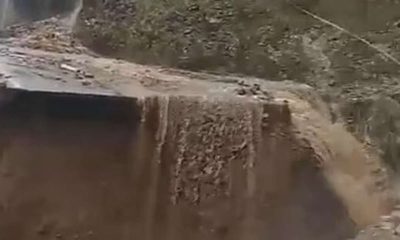
 India News24 hours ago
India News24 hours agoLandslide hits Arunachal Pradesh, highway linking Indo-China border affected
-

 Entertainment23 hours ago
Entertainment23 hours agoBollywood stars Salman Khan, Alia Bhatt, Rekha, Sonakshi Sinha, Aditi Rao Hydari attend Sanjay Leela Bhansali’s Heeramandi premiere
-

 Cricket news17 hours ago
Cricket news17 hours agoTelugu superstar Mahesh Babu meets SRH captain Pat Cummins, says it is an absolute honour
-

 Education22 hours ago
Education22 hours agoFarmer’s son Nilkrishna Gajare Nirmalkumar from Maharashtra scores 100 NTA score in IIT-JEE Mains 2024
-
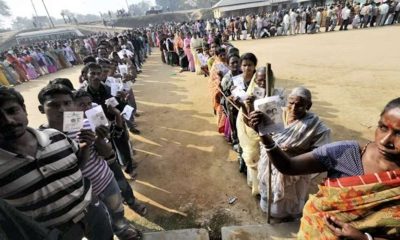
 2024 Lok Sabha Elections23 hours ago
2024 Lok Sabha Elections23 hours agoBihar: Election Commission extends voting timings for 4 Lok Sabha seats due to heatwave
-

 Entertainment20 hours ago
Entertainment20 hours agoAamir Khan to begin shooting in Delhi for Sitaare Zameen Par next month
-
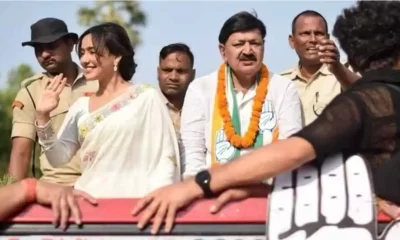
 2024 Lok Sabha Elections20 hours ago
2024 Lok Sabha Elections20 hours agoBollywood actor Neha Sharma campaigns for her father Ajit Sharma in Bhagalpur, Bihar
-

 Cricket news19 hours ago
Cricket news19 hours agoAB De Villiers criticizes RCB’s decision to let go Yuzvendra Chahal, says it was a hearbreaking moment

